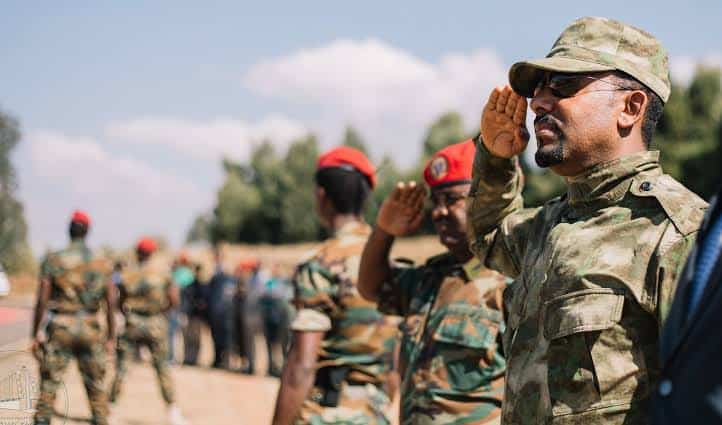When Ethiopian Prime Minister Abiy Ahmed announced he was heading to the battlefront to give a helping hand to his beleaguered troops against a coalition of rebel forces, many of his compatriots brushed it off as a publicity stunt.
Days later Abiy appeared on a video in full combat gear and barking orders as federal troops engaged the Tigray People’s Liberation Front (TPLF) and the Oromo Liberation Front (OLF) in Kasagita, a strategic town where the rebels had established a fortified position.
Since then the Ethiopian army and its allies say they have taken control of Chifra, another strategic town linking Afar, Amhara and Tigray regions.
Abiy, a Lieutenant Colonel by rank vowed that his forces would wrest control of more towns and cities including Burka and Chifra from rebel hands.
Reports reaching APA say Ethiopian forces are already marching on the industrial city of Kombolcha and the strategic town of Dessie which rebel forces captured three weeks ago.
The TPLF has not yet released an official statement regarding these apparent losses, coming a week after they had threatened to advance on the Ethiopian capital Addis Ababa.
Abiy Ahmed is optimistic that “the TPLF forces will be defeated in a matter of weeks”.
As commander in chief of the armed forces who took part in fighting during the Ethiopia-Eritrea conflict of the late 1990s and early 2000s, Abiy 45 is acting more than a ceremonial figurehead of the army.
Military sources say his presence in the battlefront has visibly made a difference in terms of mobilization and boosting troop morale.
Abiy has a reputation as a “brave and fierce fighter” earned during the war against Eritrea.
Seeing the country’s leader in the battlefield is helping to raise the spirit of the troops who just weeks ago had made many a retreat while the rebels advanced on their positions.
Ethiopian military analysts say another crucial factor that is helping to turn the tide against the rebels is the absolute control of information about the federal army and what it was up to.
Just before he left Addis Ababa, Abiy had ordered that the government put a firm lid on information about the movement of his troops which could serve as intelligence to the TPLF and their allies.
The Government Communication Service, the highest body overseeing the state of emergency in Ethiopia, had introduced a new regulation ordering media outlets to refrain from releasing battlefront related information, including the whereabouts and advances made by the Ethiopian army until disclosed officially.
Abiy seems to enjoy the backing of his compatriots at home and abroad.
Ethiopians have channeled their anger over the war to the United States and other Western powers over their alleged involvement in fanning the flames of the conflict.
What began as a routine military operation in Tigray to deal with an attack at a barracks occupied by federal forces in November last year degenerated into a fully blown conflict.
The Ethiopian government has accused the West of not only interferring in the country’s internal affair but also aiding and abetting the rebels.
MG/as/APA


